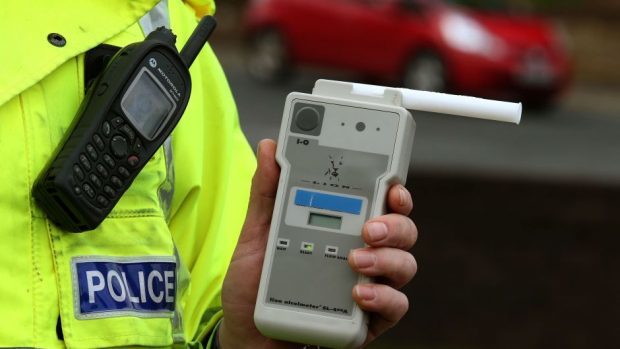Researchers have claimed the reduction of the drink-drive limit has had little effect in reducing deaths and accidents on the road.
A team at Strathclyde University has found that the lower limit has not resulted in a statistically significant overall drop in fatalities, even at night time or the weekends.
There was also little change in the death rate for young drivers aged 16-25, who are seen as one of the highest-risk groups for drink-driving.
The lower drink-drive level came into effect in Scotland in 2014, bringing the blood alcohol leve down from 0.08mg to 0.04mg per 100ml of blood.
More than 1.1 million accidents – which occurred between 2009 and 2016 – were studied for the reasearch, with more than 1.5 million casualties and 14,000 fatalities recorded.
They found that in the two years leading up to to the change in the law, Scotland had monthly accident rates of 740.63 and fatality rates of 14.96.
In the two years after, the rates were 704.13 for accidents and 15.25 for fatalities, about the same as England and Wales where the limit remained the same.
In their paper, researchers Dr Markus Gehrsitz, Dr Stuart McIntyre and student Benjamin Cooper state: “While there may be other reasons to pursue a reduction in the BAC limits, our results suggest that this further BAC limit reductions has not achieved all that might have been hoped for it in terms of road safety.
“This is not to say that previous BAC limit reductions have been an ineffective means of preventing traffic fatalities. Instead, our results indicate that the marginal returns to further BAC reductions in terms of road safety are small, which is result that policy makers should take into account when weighing the costs and benefits of alcohol-control policies.”
The research has been published just days after 12 individuals in Grampian were charged for drink-driving offences – with one 59-year-old at Peterhead Sheriff Court yesterday.
Brian Duthie was six times the drink-drive limit when he was spotted driving on Hanover Street, Charlotte Street and West Road in Fraserburgh on Friday.
Duthie, of West Road, Fraserburgh, admitted the charge yesterday and was disqualified for 18 months. He was fined £600.
Last night, Aberdeenshire Council’s transport boss and chairman of the lead officer’s group for the North East Scotland Road Casualty Reduction Strategy, urged people to think before getting behind the wheel.
He said: “A small proportion of drivers are still prepared to take the risk and drive whilst impaired, posing a significant risk to themselves and other road users. On a local basis, north east Scotland has seen too many instances of drink driving which have resulted in unnecessary deaths and serious injuries occurring on our roads.”
Councillor Allan Henderson, chairman of the Highland Road Safety Group said he wasn’t surprised by the latest research.
He said: “For me, the deduction from this research is, that it is not drink-driving that is the major factor. It may be one of them, but not evidenced here, but rather, with more drivers on our 18th to 20th century engineered roads, especially Highland, it is inevitable that the figures increase.”
